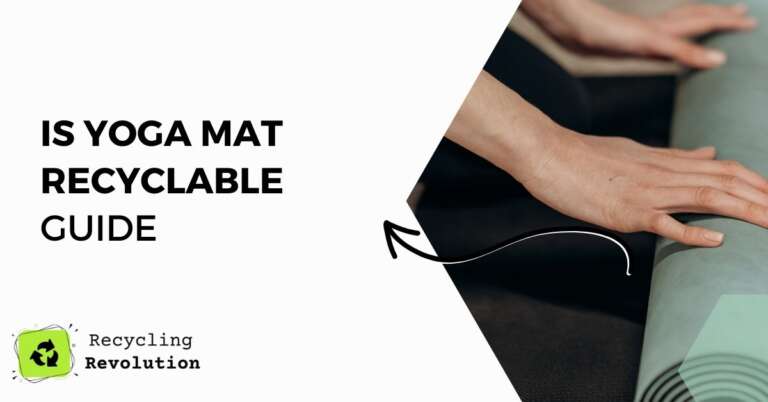TL;DR: With the increasing need for eco-friendly alternatives, recyclable yoga mats have become a popular choice among fitness enthusiasts. They not only provide the desired comfort for yoga practice but also mitigate harmful environmental impacts.
Understanding Recyclable Yoga Mats
It’s undeniable that practicing yoga requires a quality mat for comfort, grip, and stability. However, as an experienced practitioner and green enthusiast, I’ve come to realize that not all yoga mats are created equal, especially when considering their impact on the environment.
Traditional PVC (Polyvinic Chloride) yoga mats, while durable and cheap, are non-biodegradable and, when disposed of, contribute to landfill waste and environmental pollution. This issue has triggered the need for recyclable yoga mats, which I wholeheartedly recommend to all yogis out there.
Recyclable yoga mats are typically made from eco-friendly, renewable materials such as natural rubber, organic cotton, or jute. The manufacturing process of these mats also tends to be more environmentally friendly, omitting harmful chemicals and dyes.
Environmental Impact of Recyclable Yoga Mats
A common PVC yoga mat can take hundreds, if not thousands of years to decompose in a landfill, releasing toxic substances into the soil and water in the process. In contrast, a recyclable yoga mat, made from natural materials, decomposes more quickly and with less environmental impact.
The use of recyclable yoga mats significantly reduces environmental harm. A study published in the Journal of Cleaner Production (2018) suggests that yoga mats made from natural materials, like rubber or cotton, have an almost 40% lower carbon footprint than PVC mats.
Considering these numbers, it might be worthwhile to opt for recyclable yoga mats, contribute to both your health and the planet’s wellbeing.
| Natural Rubber Yoga Mat | Regular (PVC) Yoga Mat | |
|---|---|---|
| Pros |
|
|
| Cons |
|
|
Steps to Recycle a Yoga Mat
Here’s a simple guide on how to recycle your yoga mat:
- Check the Mat’s Material: Confirm that your mat is made from recyclable materials such as natural rubber or cotton.
- Find a Suitable Recycling Facility: Not all recycling centers accept yoga mats, so it’s essential to find one that does.
- Prepare the Mat: Clean your yoga mat thoroughly before recycling to remove any residue or germs.
- Drop Off the Mat: Take your mat to the recycling center or schedule a pick-up if available.
Other Sustainable Alternatives
The mat’s material isn’t the only thing to consider when seeking an eco-friendly yoga experience. A useful suggestion would be to consider alternatives like yoga towels made from sustainable materials, which can be a great addition to your yoga routine.
Yoga blocks made from cork or bamboo, rather than foam, are another viable, eco-friendly option.
Where to Buy Recyclable Yoga Mats
In today’s eco-conscious market, finding recyclable yoga mats has become increasingly straightforward. Most fitness stores and online platforms like Amazon offer a variety of choices.
Some popular brands that specialize in recyclable yoga mats include Manduka, Jade Yoga, and Prana. As a seasoned yoga practitioner, I suggest looking at product reviews and considering your personal needs before purchasing.
Conclusion
In conclusion, recyclable yoga mats are an excellent investment for both your yoga practice and the environment. They help to reduce environmental pollution, promote sustainability, and provide an effective solution for your fitness needs.
FAQ
Can all yoga mats be recycled?
No, only yoga mats made from certain materials, like natural rubber or cotton, can be recycled. PVC yoga mats are non-recyclable and harmful to the environment.
Where can I recycle my yoga mat?
You need to find a recycling facility that accepts yoga mats. Alternatively, some yoga studios and brands have recycling programs for their products.
Can I repurpose my old yoga mat?
Absolutely! If recycling is not an option, consider repurposing your old mat. They can be used as seat cushions, garden kneelers, shelf liners, and many other

